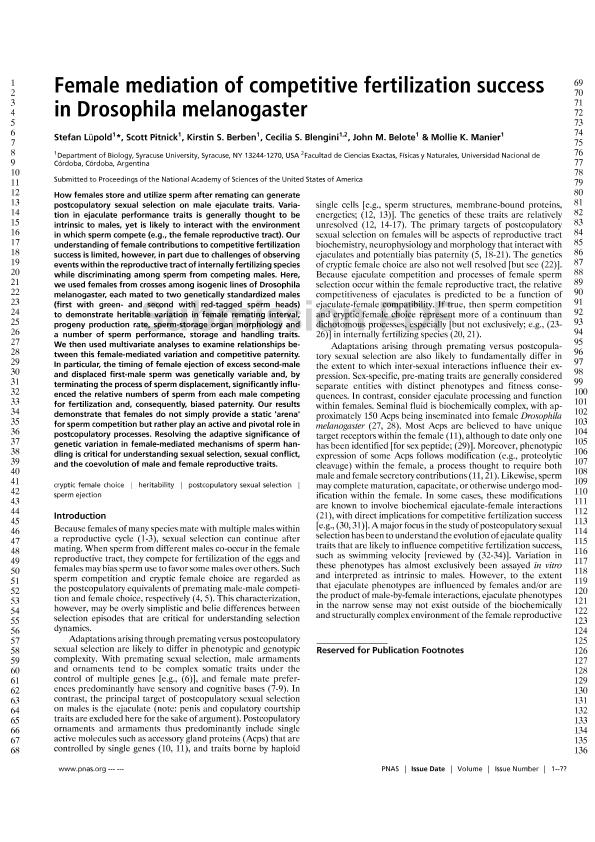Mostrar el registro sencillo del ítem
dc.contributor.author
Lüpold, Stefan
dc.contributor.author
Pitnick, Scott
dc.contributor.author
Berben, Kirstin S.
dc.contributor.author
Blengini, Cecilia Soledad

dc.contributor.author
Belote, John M.
dc.contributor.author
Manier, Mollie K.
dc.date.available
2016-11-03T20:38:38Z
dc.date.issued
2013-06
dc.identifier.citation
Lüpold, Stefan; Pitnick, Scott; Berben, Kirstin S.; Blengini, Cecilia Soledad; Belote, John M.; et al.; Female mediation of competitive fertilization success in Drosophila melanogaster; National Academy Of Sciences; Proceedings Of The National Academy Of Sciences Of The United States Of America; 110; 26; 6-2013; 10693-10698
dc.identifier.issn
0027-8424
dc.identifier.uri
http://hdl.handle.net/11336/7950
dc.description.abstract
How females store and use sperm after remating can generate postcopulatory sexual selection on male ejaculate traits. Variation in ejaculate performance traits generally is thought to be intrinsic to males but is likely to interact with the environment in which sperm compete (e.g., the female reproductive tract). Our understanding of female contributions to competitive fertilization success is limited, however, in part because of the challenges involved in observing events within the reproductive tract of internally fertilizing species while discriminating among sperm from competing males. Here, we used females from crosses among isogenic lines of Drosophila melanogaster, each mated to two genetically standardized males (the first with green- and the second with red-tagged sperm heads) to demonstrate heritable variation in female remating interval, progeny production rate, sperm-storage organ morphology, and a number of sperm performance, storage, and handling traits. We then used multivariate analyses to examine relationships between this female-mediated variation and competitive paternity. In particular, the timing of female ejection of excess second-male and displaced first-male sperm was genetically variable and, by terminating the process of sperm displacement, significantly influenced the relative numbers of sperm from each male competing for fertilization, and consequently biased paternity. Our results demonstrate that females do not simply provide a static arena for sperm competition but rather play an active and pivotal role in postcopulatory processes. Resolving the adaptive significance of genetic variation in female-mediated mechanisms of sperm handling is critical for understanding sexual selection, sexual conflict, and the coevolution of male and female reproductive traits.
dc.format
application/pdf
dc.language.iso
eng
dc.publisher
National Academy Of Sciences

dc.rights
info:eu-repo/semantics/openAccess
dc.rights.uri
https://creativecommons.org/licenses/by-nc-sa/2.5/ar/
dc.subject
Cryptic Female Choice
dc.subject
Heritability
dc.subject
Postcopulatory Sexual Selection
dc.subject
Sperm Ejection
dc.subject.classification
Otros Tópicos Biológicos

dc.subject.classification
Ciencias Biológicas

dc.subject.classification
CIENCIAS NATURALES Y EXACTAS

dc.title
Female mediation of competitive fertilization success in Drosophila melanogaster
dc.type
info:eu-repo/semantics/article
dc.type
info:ar-repo/semantics/artículo
dc.type
info:eu-repo/semantics/publishedVersion
dc.date.updated
2016-11-02T18:11:19Z
dc.journal.volume
110
dc.journal.number
26
dc.journal.pagination
10693-10698
dc.journal.pais
Estados Unidos

dc.journal.ciudad
Washington
dc.description.fil
Fil: Lüpold, Stefan. Syracuse University; Estados Unidos
dc.description.fil
Fil: Pitnick, Scott. Syracuse University; Estados Unidos
dc.description.fil
Fil: Berben, Kirstin S.. Syracuse University; Estados Unidos
dc.description.fil
Fil: Blengini, Cecilia Soledad. Consejo Nacional de Investigaciones Cientificas y Tecnicas. Centro Cientifico Tecnologico Cordoba. Instituto de Diversidad y Ecologia Animal; Argentina. Syracuse University; Estados Unidos
dc.description.fil
Fil: Belote, John M.. Syracuse University; Estados Unidos
dc.description.fil
Fil: Manier, Mollie K.. Syracuse University; Estados Unidos
dc.journal.title
Proceedings Of The National Academy Of Sciences Of The United States Of America

dc.relation.alternativeid
info:eu-repo/semantics/altIdentifier/url/http://www.pnas.org/content/110/26/10693.abstract
dc.relation.alternativeid
info:eu-repo/semantics/altIdentifier/url/https://www.ncbi.nlm.nih.gov/pmc/articles/PMC3696778/
dc.relation.alternativeid
info:eu-repo/semantics/altIdentifier/doi/https://dx.doi.org/10.1073/pnas.1300954110
Archivos asociados
